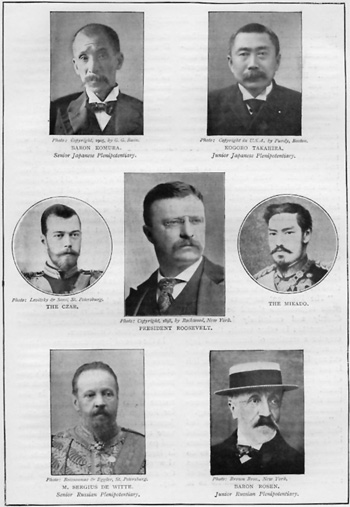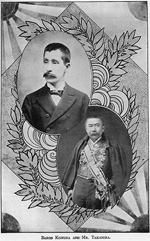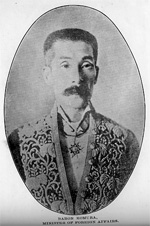 PEOPLE
PEOPLE

People, Part One
Whenever two or more men come together to do business on the principle of give and take, the personal character of the negotiators is an important element in the transaction. -- E. J. Dillon, "Sergius Witte and Jutaro Komura," Harper's Weekly, August 26, 1905.
E. J. Dillon, the chief Russian correspondent for the London Daily Telegraph, a friend of Witte, and one of the leading journalists covering the peace conference, was describing Sergius Witte and Jutaro Komura when he wrote the above words. He knew that while issues dominate any type of negotiations, it is the people involved who determine the success or failure. Dillon described the delegates as “ . . . two men who are in almost every respect as unlike each other as any two cultured human beings could be: in physical build, stature, gait, mode of thought and styles of expression. Sergius Witte, the envoy of the Tsar, is tall and powerful; Komura, the plenipotentiary of the Mikado, is undersized and frail. The one strides like a giant, the other steps forward like a lad, his right hand holding his hat and his left hand buried in his trousers pocket. Witte is a rough-hewn piece of humanity, through whose fiber some of the primary soul-forces shine, while Komura’s texture is marked by the opaqueness of the professional diplomatist.”
Witte and Komura were the primary individuals charged with the responsibility for reaching a peaceful settlement, but they alone could not have made the treaty possible. Diplomats, politicians, financiers, businessmen, spiritual leaders, military officers, journalists, and, surprisingly, average citizens participated in varying roles to achieve a conclusion that satisfied the needs of two diverse nations.

The principal characters in the drama of the Portsmouth Peace Conference. Harper's Weekly. View larger image.
Japan: Komura
To represent the Japanese position, Foreign Minister Jutaro Komura and Minister to the United States Kogoro Takahira were selected by Prime Minister Katsura. Komura had repeatedly tried to reach an agreement with Russia over Manchuria and Korea, but when that failed, he was instrumental in creating the alliance with England. He represented Japan as foreign minister throughout the war. A Harvard Law School, graduate, Komura was an experienced and determined statesman who had served as minister to Seoul, Beijing, Washington, and St. Petersburg. After leaving Portsmouth, Komura was sent to China to negotiate the Peking Treaty of November 1905. For his service to Japan in negotiating these treaties and the renewed Anglo-Japanese Alliance he was made a count. Komura was born in Nichinan, which became Portsmouth’s Japanese Sister City in 1985.
Dillon wrote, “Baron Komura …enables one to realize that the diplomatist is born, not made. For although a jurist by education and a translator by profession, he is a diplomatist par excellence—a diplomatist endowed with a mind of large compass and considerable depth, the workings of which no man can guess from his seemingly unguarded looks or unweighed language. He is celebrated in his own country for the marvelous control he possesses over his emotions. So entirely are his facial muscles under the sway of his will that they remain perfectly impassive under conditions that would try the self-reliance of a philosopher. ...As Baron Komura is famous for those qualities among a people who possess them in high degree, it is evident that he must be gifted with them superlatively.”


